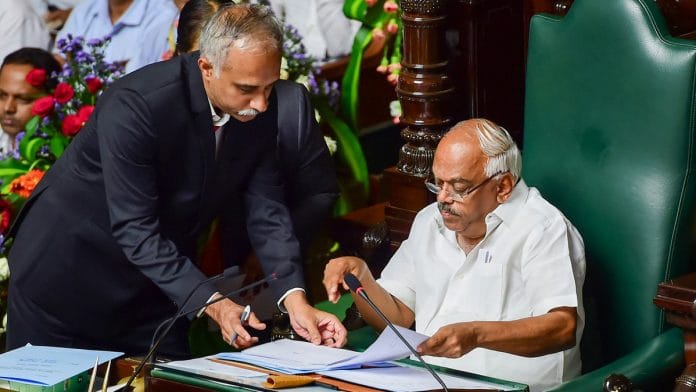The 14-month long experiment to prevent the BJP from ruling Karnataka ended Tuesday night when H.D. Kumaraswamy lost the trust vote on the floor of Karnataka legislative assembly. This collapse of the Janata Dal (Secular) and Congress coalition government was inevitable after the massive losses it suffered in the Lok Sabha election results in late May.
The arrangement suited no one, except for the Deve Gowda family and some JD(S) leaders enjoying the perks of ministerial office. Continuation of the alliance was suicidal for the Congress in the long run, as many Congress leaders had publicly argued. Most Congress legislators preferred to sit in the opposition in the assembly, so that their party would be better placed to fight future political battles. At the other end, the BJP simply wanted to return to power at the earliest for obvious reasons.
Despite this context, the fall of the Kumaraswamy government came about in extraordinary circumstances. As dissident activities gained momentum, Kumaraswamy left for America on 28 June for a private visit. Even when two Congress dissidents submitted their resignation in early July, Kumaraswamy government didn’t seem to be in imminent danger. However, an unlikely grouping of 10 Congress MLAs and three JD(S) MLAs formally resigned on 6 July, met the Karnataka governor to inform him about their political intentions and left for Mumbai. Kumaraswamy returned the same day, but by then the die was cast.
Also read: 3 reasons why Yeddyurappa worked hard to topple Karnataka’s Congress-JD(S) govt
The remarkable resolve shown by the dissident MLAs has been the critical factor in bringing down the Kumaraswamy government. Not only did they refuse to consider any political deal that the alliance partners offered, they even refused to meet the JD(S) and Congress intermediaries. When senior Congress leader and ace troubleshooter D.K. Shivakumar went to Mumbai, they sought protection from the Mumbai police. They even approached the Supreme Court seeking its intervention when the speaker of the Karnataka legislative assembly, K.R. Ramesh Kumar, didn’t accept their resignations immediately.
Such steadfast commitment to resign is unusual since the dissident MLAs didn’t seem to be motivated by ideological or moral commitments. Many of them had earlier asked for cabinet berths in the JD(S)-Congress coalition government. Perhaps, they thought even if this political crisis is averted and their demands are met, Kumaraswamy government wouldn’t last for long. Otherwise, even sitting ministers would not have resigned and joined the ranks of the rebels.
On the other hand, any deal from the BJP promised to be longer-lasting, and for the dissident MLAs that seemed to be the motivation to reject all overtures from their former parties. The trust vote debate was stretched over several days only to provide more time for the dissidents to change their mind. Note that the alliance partners continued to persuade dissidents until Tuesday afternoon, hours before the trust vote was to take place. It was only then that D.K. Shivakumar, Siddaramaiah and Kumaraswamy adopted a harsh tone to condemn the dissidents and proclaim that the latter will never be taken back.
Also read: Karnataka deserves polls, not another opportunistic govt reliant on political mercenaries
What happens now?
The BJP will put forward its claim to form the next government in Karnataka. However, it appears that pulling down the Kumaraswamy government may have been easier than forming the next government. What will determine the immediate future of Karnataka’s politics is the issue of resignations submitted by dissident MLAs. Here, the speaker’s role becomes crucial. If Ramesh Kumar accepts the resignations, then the BJP will have a clear majority in the Karnataka legislative assembly and it can form the next government. In the subsequent by-elections, the BJP will have a reasonable chance of winning majority of those seats and, thereby, secure majority in the full assembly.
However, until the resignations are accepted, the BJP’s claim to form the next government cannot and should not be entertained. Note that the BJP was in a similar situation in May 2018. B.S. Yeddyurappa fell short of the required number and had to resign. As of now, the BJP has 107 votes, including that of two Independents. So, unless the membership in the Karnataka assembly falls to 212 or less, the BJP cannot form the government.
Also read: Hunger, chocolates & pleas: What happened before Karnataka floor test was put off again
If Ramesh Kumar delays accepting the resignations, then the Supreme Court’s role becomes crucial. The Supreme Court has to decide on multiple petitions and its verdict will prove to be consequential. Note that the speaker also has to consider the disqualification plea filed by Siddaramaiah, the Congress legislative party leader, against his former colleagues. Any decision by the speaker on this matter too will end up in the Supreme Court since his ruling will be challenged by one of the two parties.
The speaker has insisted that he will strictly follow the Constitution. He has so far been quite accommodative of his parent party and he is likely to accede to most reasonable requests from them. Towards that end, he may delay taking a decision on resignations if only to prevent the BJP from forming the government. Similarly, he may not take any decision on the disqualification matter too, for that would also reduce the assembly size and facilitate the formation of the BJP government. In any case, disqualification was a threat to compel the dissidents to back the Kumaraswamy government.
If the BJP is not in a position to form the next government quickly, then President’s rule will be inevitable. That will keep Ramesh Kumar in speaker’s chair and he cannot be replaced until the next government is formed and assembly is called into session. His actions – or inactions – will chart the immediate future of Karnataka’s politics.
The author is a social historian and political commentator. He teaches History and Humanities at Krea University. Views expressed are personal.






